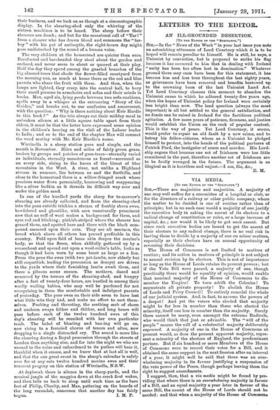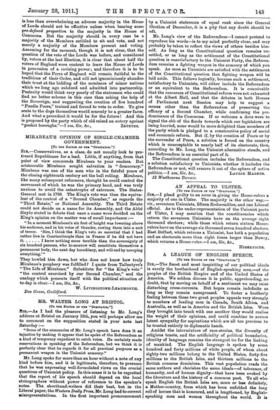VIA MEDIA.
[To THE EDITOR OF THE "SPECTATOR.")
Si,—There are majorities and majorities. A majority of one may well suffice for a committee of a hospital or club, or for the directors of a railway or other public company, where the matter to be decided is one of routine rather than of principle; but in no such ease would a majority of one justify the executive body in asking the assent of its electors to a radical change of constitution or rules, or a large increase of capital, &c.; nor would it be likely to get such assent. But since such executive bodies are bound to get the assent of their electors to any radical change, there is no real risk in leaving them to decide by a majority of one on minor matters, especially as their electors have an annual opportunity of reversing their decisions.
The House of Commons is not limited to matters of routine ; and its action in matters of principle is not subject to annual revision by its electors. This is not of importance so Jong as the House of Lords retains its present powers ; but if the Veto Bill were passed, a majority of one, though practically there would be equality of opinion, would enable that nominal majority of the House of Commons to dis- member the Empire! To turn adrift the Colonies ! To sequestrate all private property ! To abolish the House of Lords and Privy Council! To entirely remodel the whole of our judicial system. And, in fact, to assume the powers of a despot! And yet the voters who elected that majority might be far less in number than those who elected the minority, itself one less in number than the majority. Surely there cannot be many, even amongst the extreme Radicals, who would think that just or advisable. The "will of the people" means the will of a substantial majority deliberately expressed. A majority of one in the House of Commons at present would, as does the present apparent majority, repre- sent a minority of the electors of England, the predominant partner. But if six hundred or more Members of the House of Commons were to record their votes for a Bill, and it obtained the same support in the next Session after an interval of a year, it might well be said that there was an over- whelming majority in its favour justifying a suspension of the veto power of the Peers, though perhaps leaving them the right to suggest amendments.
I suggest, then, that a via media might be found by pro- viding that where there is an overwhelming majority in favour of a Bill, and an equal majority a year later in favour of the same Bill, the assent of the House of Lords should not be needed: and that when a majority of the House of Commons
is less than overwhelming an adverse majority in the House of Lords should not be effective unless when bearing some pre-defined proportion to the majority in the House of Commons. But the majority should in every case be a majority of the Members entitled to sit and vote, and not merely a majority of the Members present and voting. Assuming for the moment, though it is not clear, that the question of the veto of the Lords was before, and considered by, voters at the last Election, it is clear that about half the voters of England were content to leave the House of Lords in possession of a revising power ; and therefore it is to be hoped that the Peers of England will remain faithful to the traditions of their Order, and will not ignominiously abandon their trust at the bidding of the nominees of minor nations which we long ago subdued and admitted into partnership. Posterity would think very poorly of the statesmen who could find no better scheme in this case than asking the help of the Sovereign, and suggesting the creation of five hundred "Poodle Peers," trained and forced to vote to order. To give seats to the dogs themselves would scarcely be a greater farce. And what a precedent it would be for the future ! And this is proposed by the party which of old raised an outcry against
"pocket boroughs."—I am, Sir, &c., ZETETES.























































 Previous page
Previous page